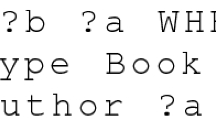Abstract
Recently, several large Knowledge Bases (KBs) have been constructed by mining the Web for information. As an increasing amount of inconsistent and non-reliable data are available, KBs facts may be uncertain and are then associated with an explicit certainty degree. When querying these uncertain KBs, users seek high quality results i.e., results that have a certainty degree greater than a given threshold \(\alpha \). However, as they usually have only a partial knowledge of the KBs contents, their queries may be failing i.e., they return no result for the desired certainty. To prevent this frustrating situation, instead of returning an empty set of answers, our approach explains the reasons of the failure with a set of \(\alpha \)
Minimal Failing Subqueries (\(\alpha \)MFSs), and computes alternative relaxed queries, called \(\alpha \)  Succeeding Subqueries (\(\alpha \)XSSs), that are as close as possible to the initial failing query. Moreover, as the user may not always be able to provide an appropriate threshold \(\alpha \), we propose two algorithms to compute the \(\alpha \)MFSs and \(\alpha \)XSSs for other thresholds. Our experiments on the WatDiv benchmark show the relevance of our algorithms compared to a baseline method.
Succeeding Subqueries (\(\alpha \)XSSs), that are as close as possible to the initial failing query. Moreover, as the user may not always be able to provide an appropriate threshold \(\alpha \), we propose two algorithms to compute the \(\alpha \)MFSs and \(\alpha \)XSSs for other thresholds. Our experiments on the WatDiv benchmark show the relevance of our algorithms compared to a baseline method.
Access this chapter
Tax calculation will be finalised at checkout
Purchases are for personal use only
Similar content being viewed by others
Notes
- 1.
For simplicity, this definition is restricted to sets but could be extended to multisets.
- 2.
- 3.
References
Dong, X., Gabrilovich, E., Heitz, G., Horn, W., Lao, N., Murphy, K., Strohmann,T., Sun, S., Zhang, W.: Knowledge vault: a web-scale approach to probabilistic knowledge fusion. In: KDD 2014, pp. 601–610 (2014)
Hoffart, J., Suchanek, F.M., Berberich, K., Weikum, G.: YAGO2: a spatially and temporally enhanced knowledge base from wikipedia. Artif. Intell. 194, 28–61 (2013)
Saleem, M., Ali, M.I., Hogan, A., Mehmood, Q., Ngomo, A.-C.N.: LSQ: the linked SPARQL queries dataset. In: Arenas, M., et al. (eds.) ISWC 2015. LNCS, vol. 9367, pp. 261–269. Springer, Cham (2015). doi:10.1007/978-3-319-25010-6_15
Fokou, G., Jean, S., Hadjali, A., Baron, M.: Handling failing RDF queries: from diagnosis to relaxation. Knowl. Inf. Syst. (KAIS) 50(1), 167–195 (2017)
Aluç, G., Hartig, O., Özsu, M.T., Daudjee, K.: Diversified stress testing of RDF data management systems. In: Mika, P., Tudorache, T., Bernstein, A., Welty, C., Knoblock, C., Vrandečić, D., Groth, P., Noy, N., Janowicz, K., Goble, C. (eds.) ISWC 2014. LNCS, vol. 8796, pp. 197–212. Springer, Cham (2014). doi:10.1007/978-3-319-11964-9_13
Hurtado, C.A., Poulovassilis, A., Wood, P.T.: Ranking approximate answers to semantic web queries. In: Aroyo, L., Traverso, P., Ciravegna, F., Cimiano, P., Heath, T., Hyvönen, E., Mizoguchi, R., Oren, E., Sabou, M., Simperl, E. (eds.) ESWC 2009. LNCS, vol. 5554, pp. 263–277. Springer, Heidelberg (2009). doi:10.1007/978-3-642-02121-3_22
Huang, H., Liu, C., Zhou, X.: Approximating query answering on RDF databases. J. World Wide Web: Internet Web Inf. Syst. (WWW) 15(1), 89–114 (2012)
Calì, A., Frosini, R., Poulovassilis, A., Wood, P.T.: Flexible querying for SPARQL. In: Meersman, R., Panetto, H., Dillon, T., Missikoff, M., Liu, L., Pastor, O., Cuzzocrea, A., Sellis, T. (eds.) OTM 2014. LNCS, vol. 8841, pp. 473–490. Springer, Heidelberg (2014). doi:10.1007/978-3-662-45563-0_28
Hogan, A., Mellotte, M., Powell, G., Stampouli, D.: Towards fuzzy query-relaxation for RDF. In: Simperl, E., Cimiano, P., Polleres, A., Corcho, O., Presutti, V. (eds.) ESWC 2012. LNCS, vol. 7295, pp. 687–702. Springer, Heidelberg (2012). doi:10.1007/978-3-642-30284-8_53
Elbassuoni, S., Ramanath, M., Weikum, G.: Query relaxation for entity-relationship search. In: Antoniou, G., Grobelnik, M., Simperl, E., Parsia, B., Plexousakis, D., Leenheer, P., Pan, J. (eds.) ESWC 2011. LNCS, vol. 6644, pp. 62–76. Springer, Heidelberg (2011). doi:10.1007/978-3-642-21064-8_5
Dolog, P., Stuckenschmidt, H., Wache, H., Diederich, J.: Relaxing RDF queries based on user and domain preferences. J. Intell. Inf. Syst. (JIIS) 33(3), 239–260 (2009)
Reddy, K.B.R., Sreenivasa Kumar, P.: Efficient trust-based approximate SPARQL querying of the web of linked data. In: Bobillo, F., Costa, P.C.G., d’Amato, C., Fanizzi, N., Laskey, K.B., Laskey, K.J., Lukasiewicz, T., Nickles, M., Pool, M. (eds.) UniDL/URSW 2008-2010. LNCS, vol. 7123, pp. 315–330. Springer, Heidelberg (2013). doi:10.1007/978-3-642-35975-0_17
Author information
Authors and Affiliations
Corresponding author
Editor information
Editors and Affiliations
Rights and permissions
Copyright information
© 2017 Springer International Publishing AG
About this paper
Cite this paper
Dellal, I., Jean, S., Hadjali, A., Chardin, B., Baron, M. (2017). On Addressing the Empty Answer Problem in Uncertain Knowledge Bases. In: Benslimane, D., Damiani, E., Grosky, W., Hameurlain, A., Sheth, A., Wagner, R. (eds) Database and Expert Systems Applications. DEXA 2017. Lecture Notes in Computer Science(), vol 10438. Springer, Cham. https://doi.org/10.1007/978-3-319-64468-4_9
Download citation
DOI: https://doi.org/10.1007/978-3-319-64468-4_9
Published:
Publisher Name: Springer, Cham
Print ISBN: 978-3-319-64467-7
Online ISBN: 978-3-319-64468-4
eBook Packages: Computer ScienceComputer Science (R0)




